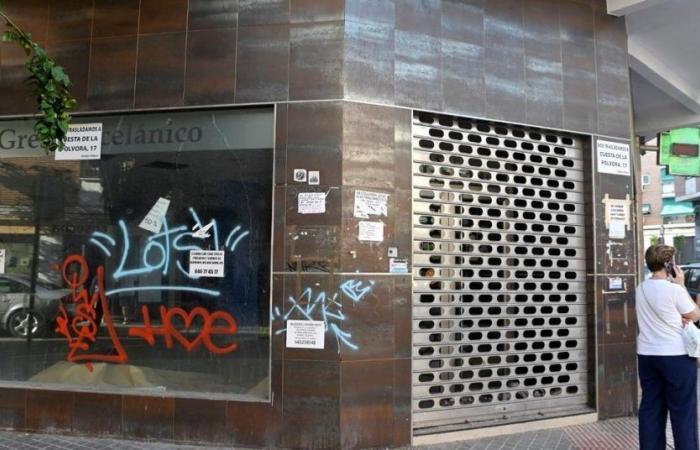Cordova/The closed-down windows and the “For Rent” signs are increasingly common images on the streets where years ago there were shop windows full of goods and hustle and bustle from morning to afternoon. And it is that he traditional trade, which fills the neighborhoods with activity and allows the construction of more comfortable and sustainable neighborhoods, is dying in the province. According to the data provided to The day by Comercio Córdoba, in the last year the province has lost 168 self-employed workers of commerce, which is equivalent to 168 closed establishments and 168 empty storefronts. The lifeless streets expand through the towns and neighborhoods.
The president of Comercio Córdoba and Comercio Andalucía, Rafael Bados, launched an SOS this Tuesday in response to this “continuous loss” of entrepreneurs that has been occurring in the sector since 2021. The evolution is so bad that currently the traditional commerce sector registers worse data than in 2020, in the midst of the Covid-19 pandemic. In the specific case of the province, today there are 14,394 merchants registered in the self-employed regime, compared to 15,211 in 2019, before the coronavirus changed everything.
Following the end of the lockdown, there was an increase in economic activity and, with it, new businesses were launched. However, many of these did not take off and the situation has only worsened since then. The data from Comercio Córdoba are discouraging, as the province has lost 816 self-employed trade workers in the last five years. And, in Andalusia as a whole, the sector warns that since May 2021, almost 6,000 self-employed workers have been deregistered, going from 149,534 in 2021 to the current 143,739 self-employed workers. And, as is the case in Córdoba, Comercio Andalucía warns that the figure is even lower than that of May 2020, in the midst of the crisis due to the Covid-19 pandemic, and of course is far from the 148,850 of a year ago.
The difficulty of competing with large stores
/ Juan Ayala
Bados warns that, among the reasons that have caused this decline, are the “impossibility of many small businesses to compete with large stores and with the large online sales platforms, as well as the fact that the public administrations as a whole have not been successful in implementing the aid that the sector needed to overcome the consequences of the pandemic.” Likewise, it considers that the increase in costs as a result of the energy crisis and global instability and the rise in inflation that has had an impact on consumption “have been the last straw for a sector hit hard by the financial crisis of 2008 and by the caused by the 2020 pandemic.”
For the confederation, public administrations with powers “must take more seriously the need to implementto support measures to small and medium commerce, a sector that is key to the economy of Andalusia due to its contribution to the GDP and the creation of quality employment.” Finally, the sector demands that these measures “must be adopted in agreement with the representatives to guarantee that their design is adapted to the real needs of local commerce and, therefore, are effective in responding to them.
Premises that are converted into housing
A walk through the center of Córdoba capital helps to confirm that the sector’s warning signal is not trivial. And, beyond central streets like Cruz Conde, Gondomar or Concepciónwhere the Franchises, there are dozens of closed establishments, with the blinds drawn all the way down due to the increasingly high rents. And another observation is that the vast majority of establishments, whether franchises or not, are dedicated to fashion. Greengrocers, butchers and fishmongers have been an exception for years, which has also led residents who resist in the central neighborhoods to denounce the phenomenon of gentrification and what it entails. More expensive rentals and establishments dedicated mainly to hospitality, oriented towards tourism, with few possibilities for traditional commerce.
The situation in the neighborhoods It is not better. Traditional commerce barely survives in Jesús Rescatado, Santa Rosa or Ciudad Jardín, although with an increasingly limited supply. In fact, a tour of Garden City allows us to discover that many ground floors that until recently were local businesses have been converted into homes, most of them intended for tourist rental due to their proximity to the train and bus stations: the safes on the facades to store the keys and facilitating access give them away.
El Guijo and Fuente-Tójar, towns with a single business
In the towns, the decline of traditional commerce is also evident, to the point that there are municipalities where only one establishment remains open. It is the case of The Guijoin the region of Los Pedroches, and Fuente-Tójar, in Subbética, as recorded in the cadastral statistics of the Ministry of Finance, updated this June with data from the second quarter of the year. In other small towns such as Conquista, Fuente La Lancha, Villaharta or San Sebastián de los Ballesteros, two commercial establishments resist, according to data from the Cadastre, with all that this entails for the older population that resists in these centers and lacks the means to get around. to reference municipalities. Meanwhile, three businesses coexist in La Granjuela and four in Valenzuela and Santa Eufemia.
According to the official statistics of the Treasury, in Córdoba capital there are 15,017 establishments with commercial use registered, while in Lucena, the most populated town after the capital, there are 1,438. In Genil Bridge 908 businesses are included in the Cadastre, in Montilla 787 and in Priego de Córdoba 740. Empty stores, however, accumulate in the most central streets, outside of which it is practically impossible to find any trace of commercial activity.

















